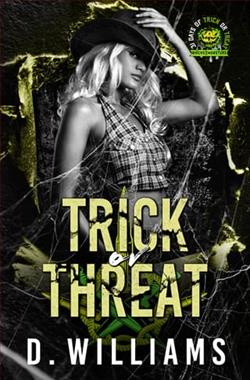Page 1 of Forbidden (Old West 1)
Prologue
Georgia 1865
Wearing the blue uniform of the Union Army, Rhine Fontaine tethered his horse to the post and surveyed the charred piles of rubble of the house that once anchored the largest plantation in the county. It had also been his home. The sight of the destruction pleased him even though the bitter memories of his life there would follow him to the grave. The former two-story mansion with its Romanesque columns, wide front porch, and well-kept grounds had been set afire by his great aunt Mahti. She’d died in the flames along with his crippled, bed-ridden father, Carson Fontaine, who’d ruled his three hundred slaves with all the cruelty of a medieval king. Rhine hoped Carson was rotting in hell, but he mourned Mahti. She’d raised him, loved him, and helped him try and make sense of the harsh unfeeling world he’d been born into. With her gone, he and his younger sister Sable were the last living ties to their mother, Azelia, the descendant of an enslaved African queen. Rhine had been so young when Azelia died he could no longer recall her face, voice, or touch, and that, too, fed his bitterness. Slavery had been an abomination. Rhine hated it and this place so deeply that were he not seeking information on Sable’s whereabouts, he would never have come back.
He walked past the mansion’s remains to see if the rows of slave cabins were still out back and maybe find someone with news of Sable. Although the war was over and slavery was dead, many of the enslaved had chosen to remain with their masters. He couldn’t begin to understand their thinking nor did he judge, because he’d made what some would consider an equally unthinkable choice.
The cabins were there but in such terrible disrepair he doubted anyone lived in them anymore. Entire sections of the wooden walls were gone and many had no roofs. Weeds had grown tall enough to fill doorways, and as he stood in the eerie silence memories flowed back of slave children running and playing after a long day in the fields; their mothers cooking and mending, their fathers tending the small gardens that held beans, corn, yams, and collards to supplement the lean rations Carson grudgingly supplied. Those remembrances also brought back the sounds of mothers screaming helplessly while some of those same children were dragged off and sold.
From behind him a woman’s voice snarled, “There’s nothing left to steal here, Yankee, so, get off my land.”
He turned to see his father’s wife, Sally Ann Fontaine, standing in the doorway of one of the dilapidated cabins. Her ragged dirty gown, unkempt hair, and shoeless feet were shocking. The last time he’d seen her she’d been queen to Carson’s king. Now she looked worse than any of the slaves.
“Hello, Mrs.Fontaine.”
She studied him for a brief moment before recognition widened her brown eyes. “You! Where’s my Andrew?”
Andrew was his half brother. They’d gone to war together to fight for the Confederacy. “I don’t know. After the first battle, Drew deserted. Said he was heading west.”
“You’re lying!” And as if the hope of her son’s return was the only thing keeping her sanity intact, she leapt upon him screaming obscenities and pounding him with ineffectual fists. “No, you lying bastard! Where’s my son!”
He grabbed her wrists. “I don’t know.” And he didn’t. He also didn’t remind her that she and Drew had been estranged when they rode off to war because Drew refused to treat the slaves the way their father did.
As she crumbled and began weeping, he released her wrists and asked, “Have you seen my sister Sable?”
The tears stopped and the hate in her eyes seared him. “She ran off the morning after that old witch Mahti set fire to the house. Heard she was in one of the camps, so I sent a man to bring her back, but he said she’d taken up with some fancy French Black who refused to hand her over.”
Rhine assumed she was referencing Major Raimond LeVeq. When Rhine last saw his sister a year ago, he’d already switched his allegiance to the Union army, and she’d been a laundress in a contraband camp. LeVeq, a ranking officer at the camp, had been taken by his beautiful sister. Sadly, after only a few days Rhine’s unit had moved on and he’d had to leave Sable behind. Hearing that LeVeq had kept her out of Sally Ann’s clutches pleased him, but he had no idea where she was now. He also wondered about the fate of his half sister, Sally Ann’s daughter, Mavis.
“What are you doing in a fancy Yankee uniform?” Sally Ann asked.
Rhine didn’t reply. As the silence lengthened, she offered a bitter chuckle. “Passing again, are you?”
Rhine’s ivory skin, jet black hair, and green eyes made it easy for him to pass as someone he wasn’t. He was ten years old when he first realized he could do it successfully. In his role as Andrew’s slave, he’d accompanied the Fontaine family to a hotel in Atlanta. When their father Carson walked into the hotel’s restaurant and saw Rhine eating at the table with Andrew instead of in the back with the other slaves, he waited until they returned home and whipped Rhine until he bled. Ten-year-old Andrew had been whipped as well, but not as severely.
In a voice dripping with disgust, Sally Ann sneered, “Andrew turns his back on his race, and you turn your back on yours. What a wretched pair you are. Get off my land and don’t ever come back.”
Riding away, Rhine trusted that the old African queens whose blood ran in his veins would reunite him with Sable in the near future. With that belief settled firmly in his heart, he headed to his own future; one he planned to live out as White.











